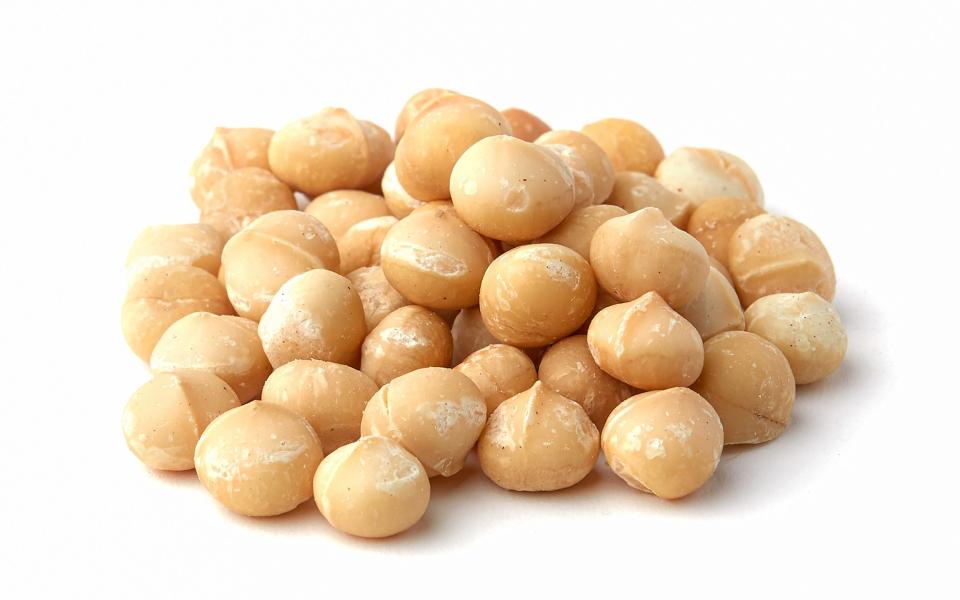The secret health superpowers of the humble nut
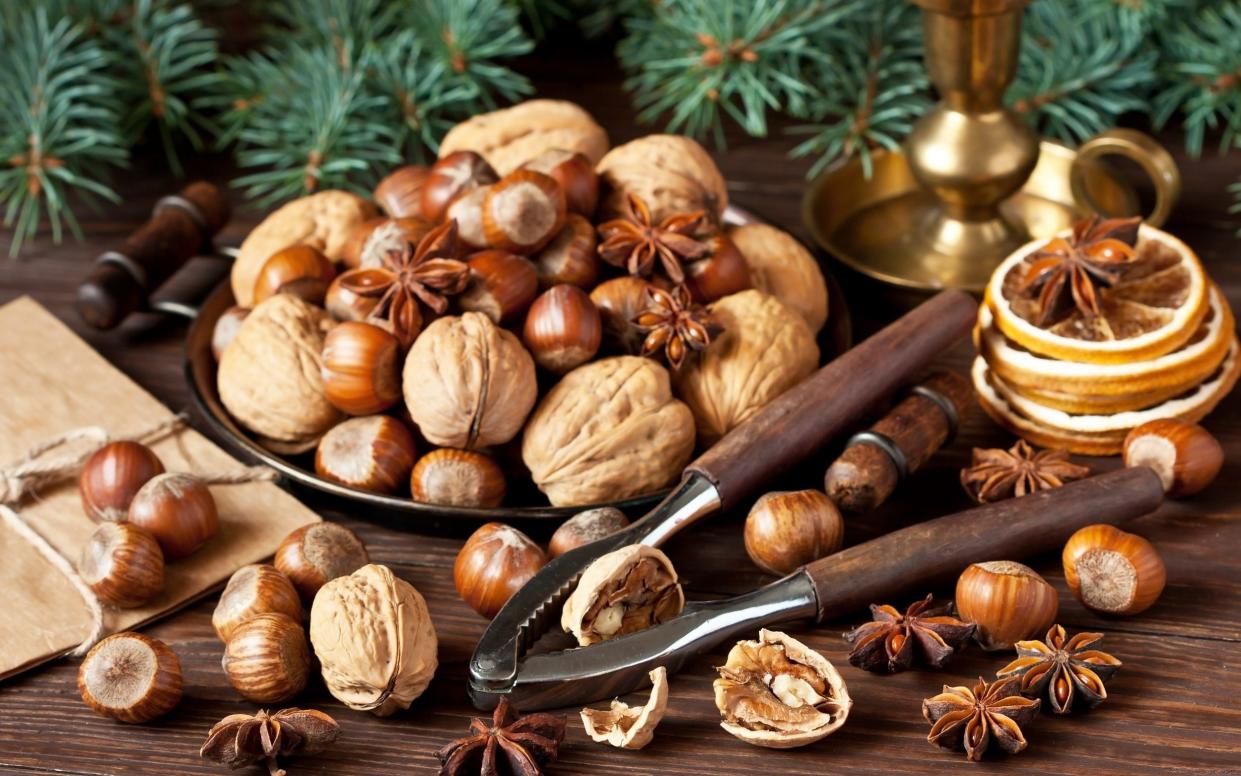
Christmas isn’t Christmas without a bowlful of nuts – and the good news is that those walnuts, brazils and cashews could offer a welcome antidote to the unhealthy excesses of most seasonal fare.
Eating plant foods regularly may reduce the risk of an array of serious health conditions, according to a mounting body of research. Now, a new study by German scientists suggests that swapping animal products for plant-based foods like nuts can significantly lower the chances of having a heart attack or stroke.
Researchers from the German Centre for Diabetes Research reviewed 37 published studies to assess the health impact of switching red and processed meat, poultry, fish, eggs and dairy for plant foods like beans, nuts, whole grains, oils, fruit and vegetables.
They found that replacing 50g of processed meat a day with 25g of nuts reduced the risk of cardiovascular disease by 25 per cent; swapping a daily egg for nuts was linked to a 17 per cent lower risk. Similar benefits were seen for type 2 diabetes and the risk of dying from all causes.
While nutritional scientist Toral Shah points out that the swaps in the German study are not “like for like”, she accepts research highlights the significant potential health benefits of regularly swapping foods high in saturated fat – not just red and processed meats, but things likes shop-bought biscuits, cakes and pastries – with nuts.
Goodness in a shell
Nuts really are remarkable powerhouses of goodness. They are brimming with healthy mono- and poly-unsaturated fats, protein, fibre and essential micronutrients such as folic acid, niacin, calcium, magnesium and potassium.
“A key health benefit of nuts is the healthy mono- and polyunsaturated fats they contain,” says Shah. “There are only a few foods we get these ‘good’ fats from, such as olive oil and olives, avocados, nuts, seeds and fish. We know that good fat is definitely better for our cardiovascular health, our metabolic health and our brain health.”
Many nuts also contain l-arginine, an amino acid (building block of protein) that plays an important role in numerous bodily processes including dilating and relaxing the arteries and supporting blood flow.
Source of fibre
Nuts are also a valuable source of fibre, which most of us in the UK don’t consume enough of. “We know that’s important for our gut health, which impacts the health of our immune system and our mental health and mood,” Shah says.
Victoria Taylor is nutrition lead at the British Heart Foundation and says there’s no “healthiest” nut because they all have different nutritional benefits, so she recommends eating a mix of different sorts to benefit our gut health.
“Peanuts, and other tree nuts such as almonds and walnuts, have all been linked to a reduced risk of cardiovascular disease,” she says. “Plain nuts are healthier, even better if they still have their skins on for some extra fibre, but they don’t have to be boring.”
Taylor suggests dry frying or toasting them in the oven to boost their flavour. “Try adding spices like Chinese five-spice, paprika or cayenne pepper,” she says. “For a sweeter flavour, try cinnamon or vanilla extract.”
Nut butters can also be good (two heaped teaspoons a day of nut butters mixed into or spread on other foods) but only varieties that don’t contain added palm oil, salt, sugar or other additives.
Fatty risks
But aren’t nuts associated with weight gain? It’s worth remembering that the health benefits of nuts don’t extend to those covered in chocolate, honey or syrup, or doused in sugar or salt (including dry roasted). But even if you eat your nuts plain, they do contain lots of fat, so experts recommend you stick to 30g a day – a small, cupped handful.
On the other hand, some studies show that, because nuts are rich in fat, protein and fibre, they leave you feeling fuller for longer and may help maintain or even lose weight.
How healthy is your favourite nut?
Let’s get down to the nuts (and bolts) of this issue. Figures are per 30g portion, healthy fats = unsaturated fats (monounsaturated + polyunsaturated).
Peanuts (raw)
Technically a legume, peanuts are high in heart-healthy fats and are an excellent source of protein, and also contain useful amounts of vitamins and minerals. These attributes make them an excellent option for vegetarians. Peanuts are brimming with B vitamins (B1, B3, B5, B9), and minerals including copper, magnesium, phosphorous, magnesium and biotin.
Calories: 172 / Protein: 8g / Fibre: 2.5g / Healthy fats: 13g
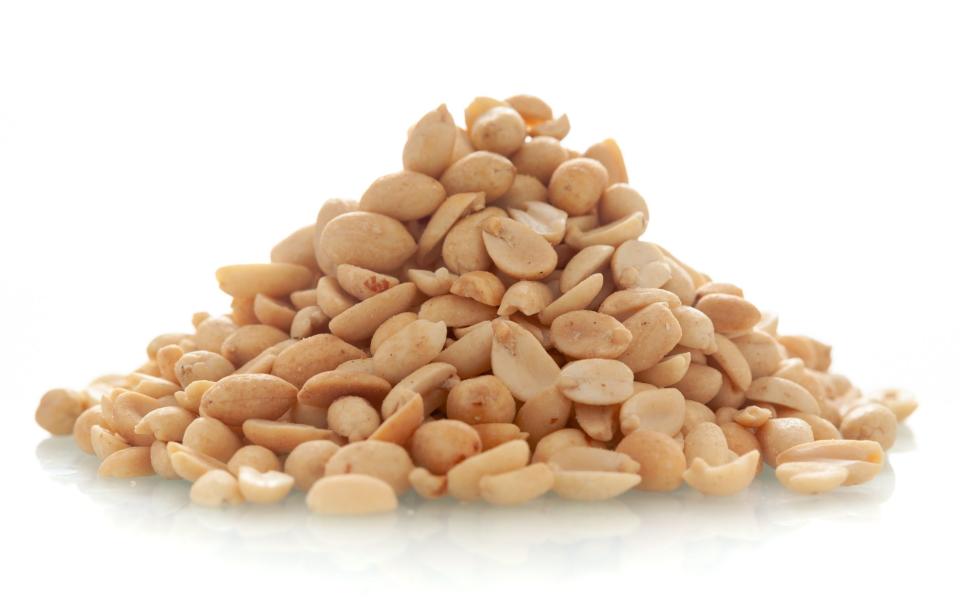
Cashews
A good source of protein, and especially rich in heart-healthy fats and other nutrients, cashews are another good choice for vegetarians. High in copper (essential for energy, brain development and a healthy immune system), cashews are also a great source of magnesium and manganese.
Calories: 172 / Protein: 5g / Fibre: 1.3g / Healthy fats: 11g
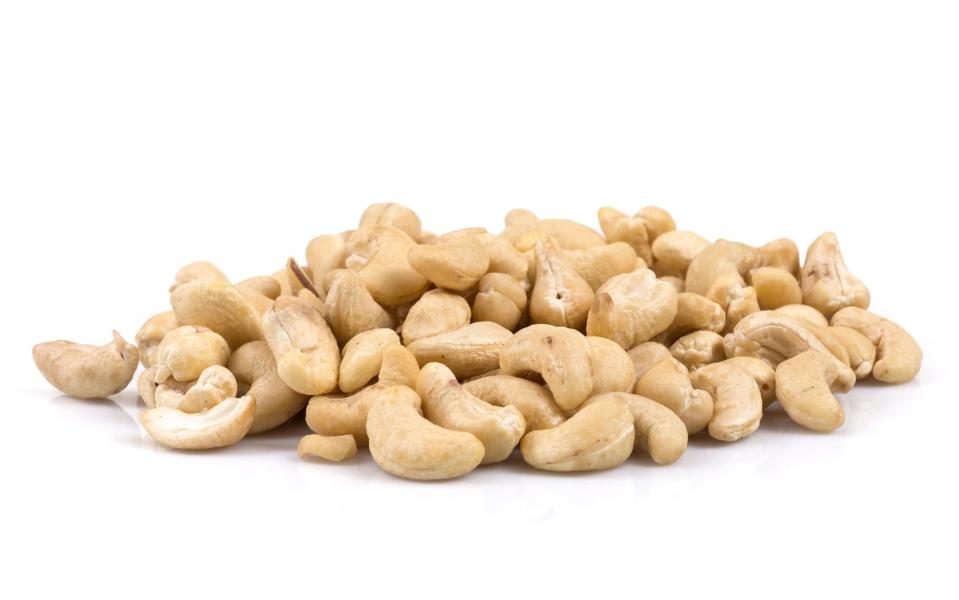
Almonds
Almonds are rich in healthy fats (and low in saturated fats) and fibre and are also among the best sources of vitamin E and calcium. They are also packed with antioxidants, which protect against inflammation, ageing and some diseases. The skin on almonds is where anti-oxidants are concentrated – it’s also beneficial for gut health – so blanched almonds don’t have the same benefits as those with the skin on.
Calories: 184 / Protein: 6g / Fibre: 2g / Healthy fats: 15g
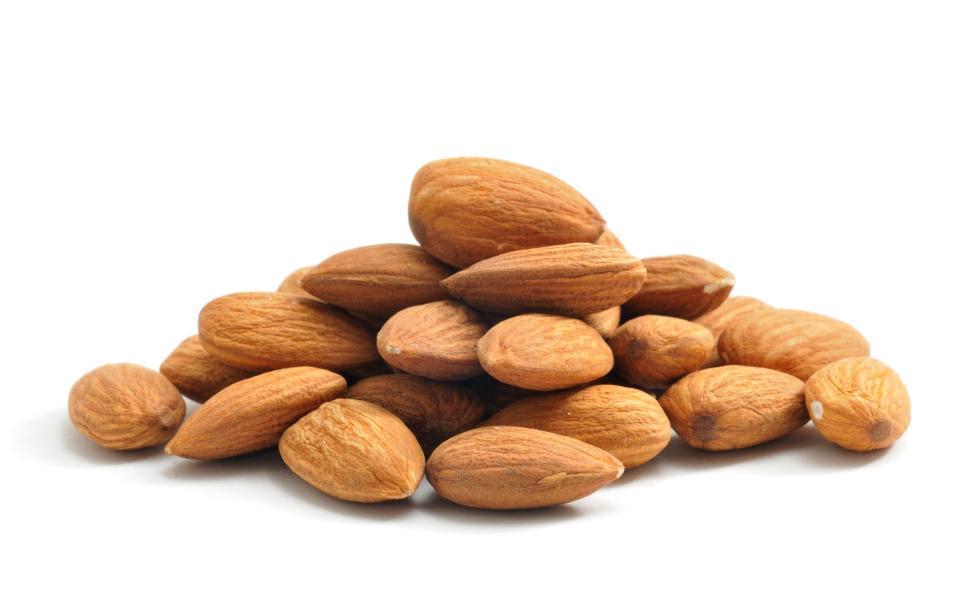
Walnuts
Walnuts contain more essential omega-3 fats – which may reduce the risk of cardiovascular disease and other conditions – than any other nut. They’re also an excellent source of antioxidants, which can lower levels of LDL (bad) cholesterol. Eating walnuts also helps healthy gut bacteria flourish.
Calories: 206 / Protein: 4.5g / Fibre: 1.4g / Healthy fats: 17g
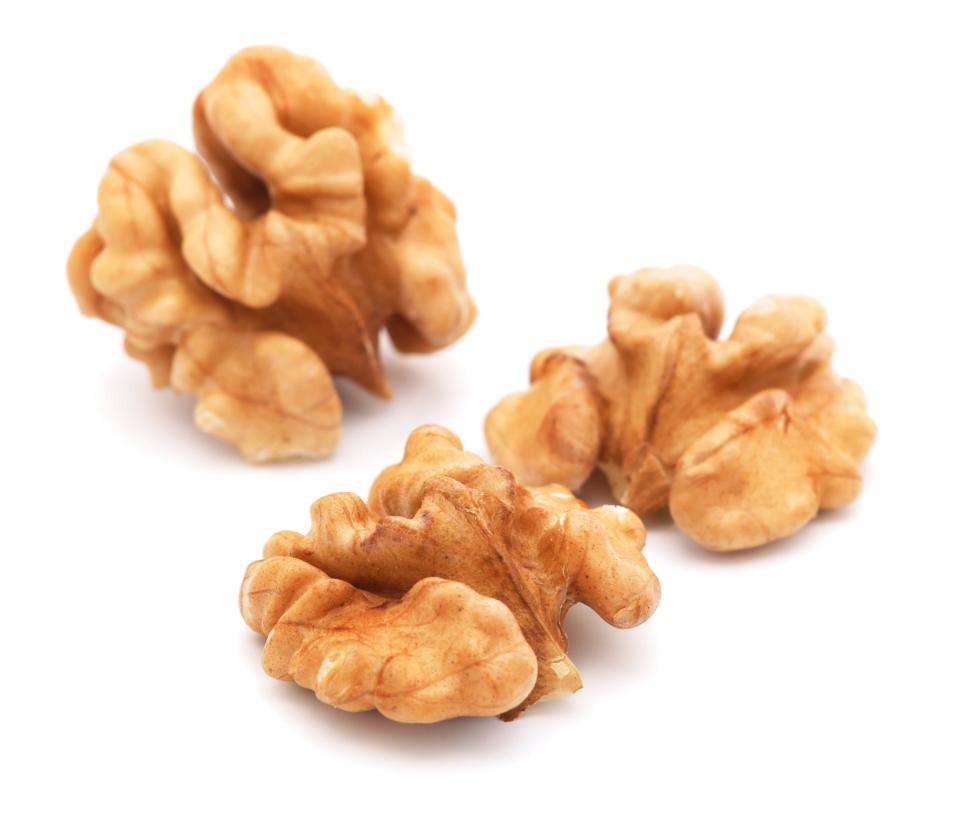
Hazelnuts
Like walnuts, hazelnuts are high in calories but also rich in a wide variety of nutrients including vitamin E, thiamine (B1), magnesium, copper and manganese. They’re abundant in heart-protective antioxidants (mostly in the skin) and have been shown to help reduce blood sugar levels.
Calories: 195 / Protein: 4g / Fibre: 2g / Healthy fats: 17g
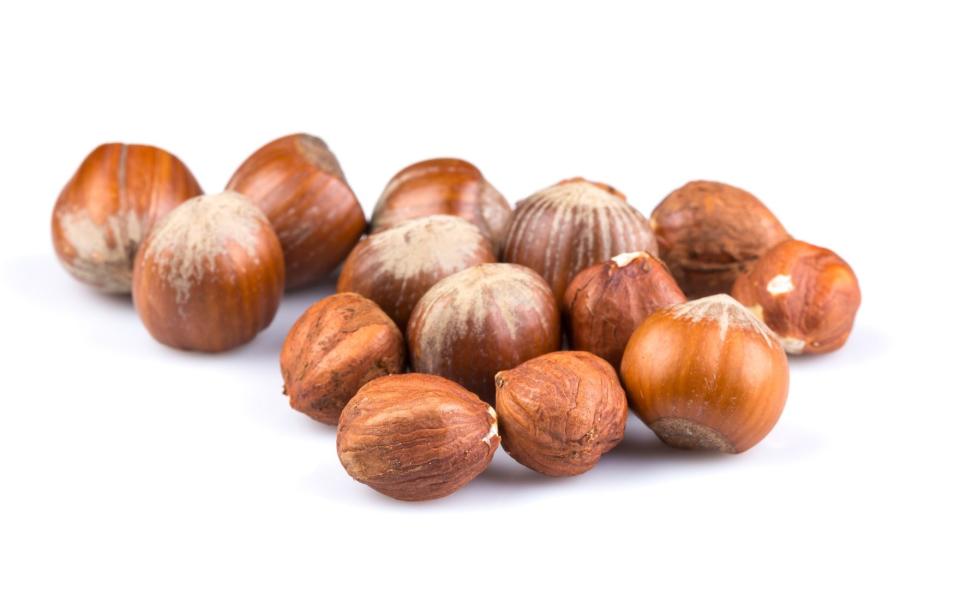
Brazil nuts
Brazil nuts are prized as one of the richest sources of selenium, a mineral that supports our immune system and cell growth and is vital for thyroid function. Although high in saturated fat, they also contain healthy fats, fibre, antioxidants, vitamins E and B1, and an array of minerals including copper, magnesium, phosphorous and manganese.
Calories: 205 / Protein: 4.5g / Fibre: 1.7g / Healthy fats: 14g
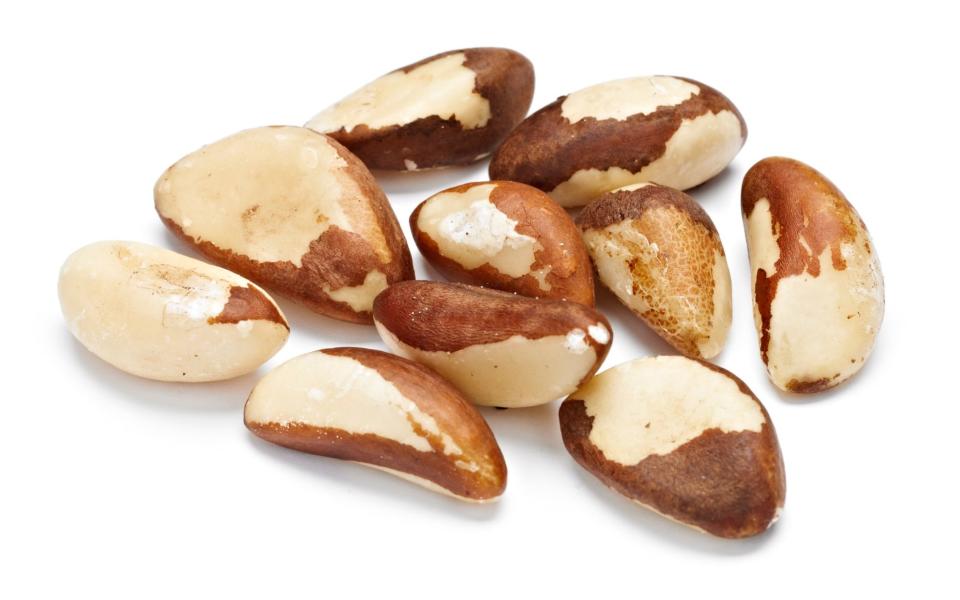
Pistachios
Lower in fat and calories and higher in protein than many other nuts, pistachios are also rich in potassium and vitamin B6 (important for regulating blood sugar levels and supporting the flow of oxygen in the blood). They’re good sources of compounds that are important for eye health.
Calories: 169 / Protein: 6g / Fibre: 3g / Healthy fats: 11g
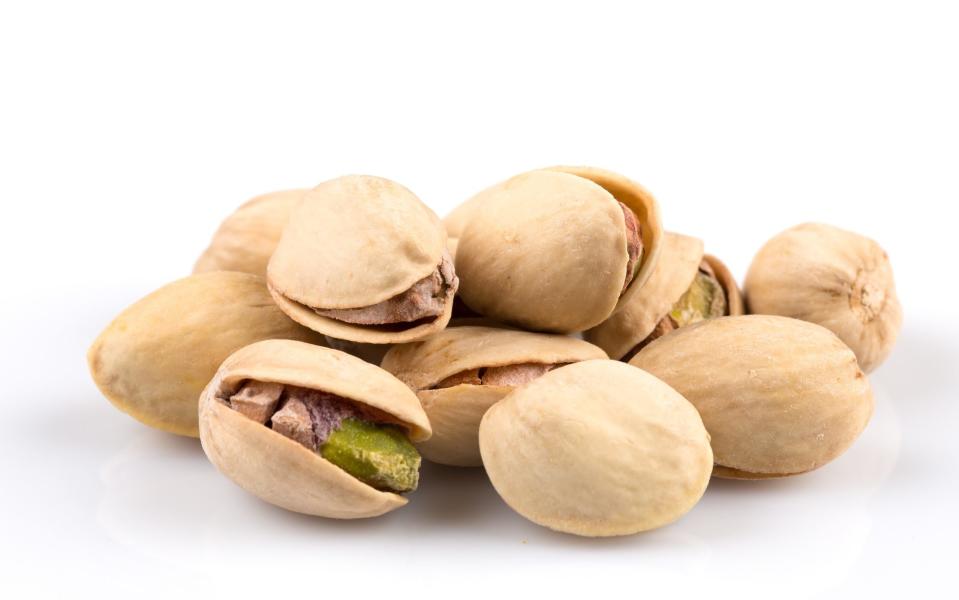
Pecans
Creamy, mild-tasting pecans are rich in zinc, which supports many bodily functions including the immune system and wound healing. They’re also rich in heart-healthy fats but quite high in calories and low in protein.
Calories: 207 / Protein: 3g / Fibre: 2g / Healthy fats: 18g
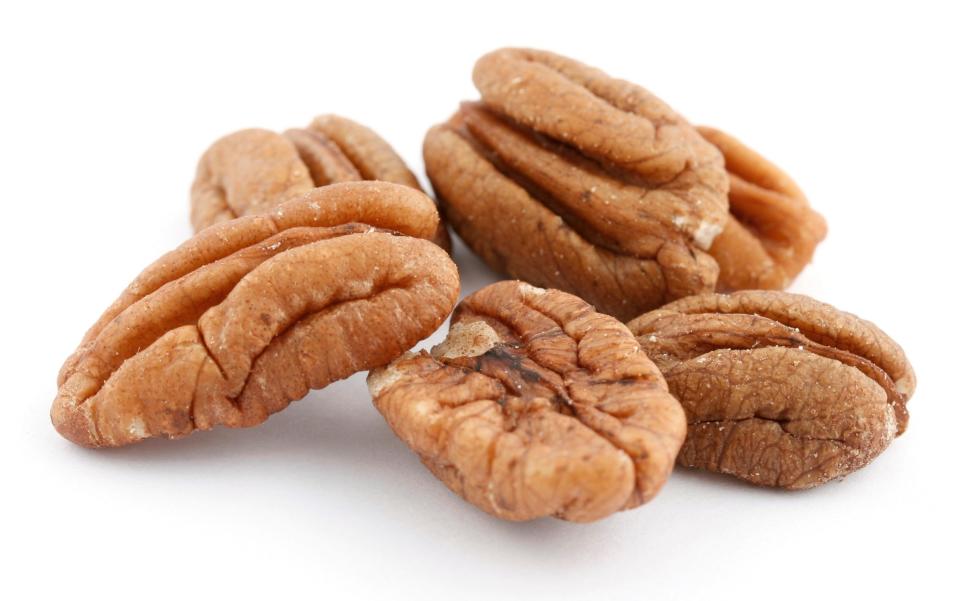
Pine nuts
These tiny nuts are brimming with vitamin E, which supports healthy skin. They also contain pinolenic, a kind of fatty acid which may help lower levels of LDL (bad) cholesterol and are a source of omega-3s.
Calories: 206 / Protein: 4g / Fibre: 1g / Healthy fats: 18.3g
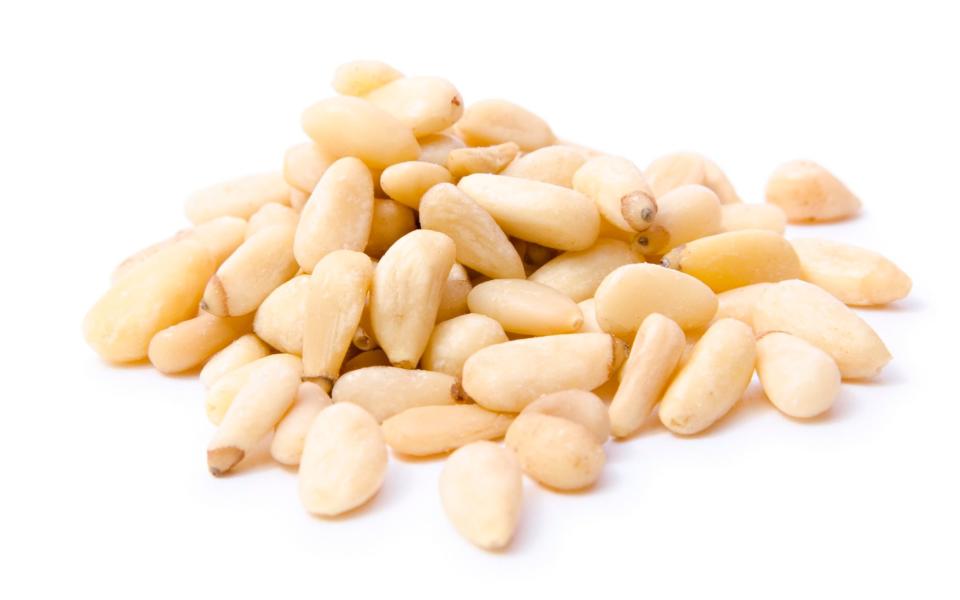
Macadamias
Creamy and buttery, macadamias have one of the highest fat contents of all nuts, and among the lowest protein. But they’re the richest source of monounsaturated fats, which help reduce the risk of heart disease and help manage cholesterol levels. They’re particularly rich in manganese, copper and magnesium, as well as thiamine (vitamin B1).
Calories: 215 / Protein: 2g / Fibre: 3g / Healthy fats: 18.3g
